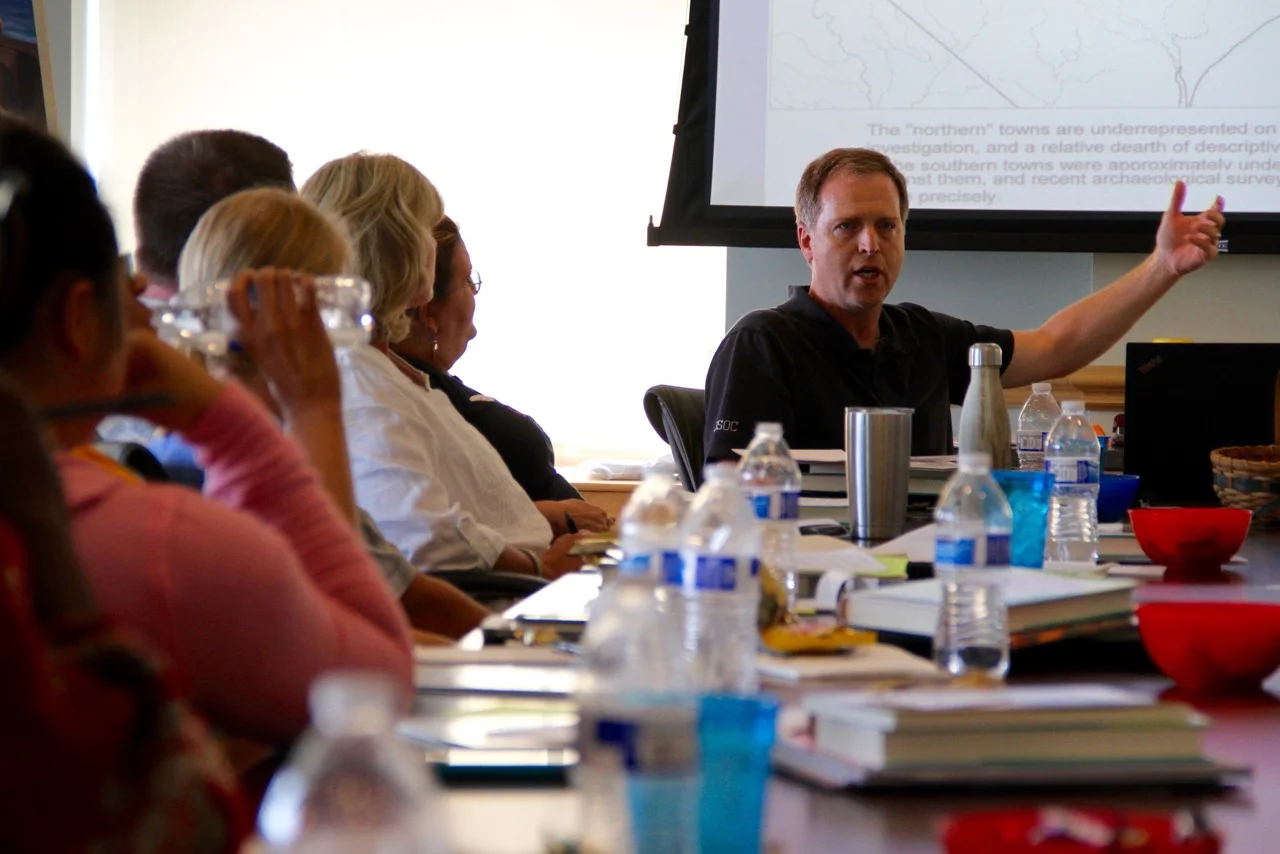Teaching the teachers: UNC program brings NC history alive for classroom teachers
August 2015 | UNC@Work
UNC Professor Wayne Lee talks about Native American warfare at a workshop for NC teachers.
It was a sight to shock any grade schooler — a classroom full of teachers, all seated around a table for group work, eagerly raising their hands to be called on and volunteer in front of the class.
This is the world of the North Carolina Civic Education Consortium, where teachers come to be students again. At a workshop in New Bern last month, educators from more than a dozen counties gathered to learn about forgotten chapters of North Carolina history, from Native American warfare to lost languages.
For two days, they toured historic Tryon Palace, met with researchers and professors from the state’s public universities, and worked together on creative ideas to bring history alive for their students.
“It’s great to be here and meet such wonderful people,” said Shannon Best, an American history teacher at Midway High School in Newton Grove. “We’re treated like professionals, and the small-group setting is great for learning and working together.”
The Civic Education Consortium is part of UNC Chapel Hill’s Program in the Humanities and Human Values, which celebrates the arts and sciences through public outreach. Each year, the program holds teacher enrichment workshops across the state, with lessons tailored to the K12 curriculum. It also offers a repository of lesson plans and classroom material that teachers can use for inspiration.
“Being able to learn from others, to use these resources so I don’t have to reinvent the wheel all the time, it really helps,” said Kathy Richards, a language arts and social studies teacher from Oak Hill Elementary in Oxford, North Carolina. “I love finding creative ways to cover North Carolina history while also teaching reading and writing.”
One of the activities in New Bern focused on runaway slaves in antebellum North Carolina. N.C. Central University Professor Freddie Parker spoke about his research using old newspaper advertisements from plantation owners trying and find runaways. These notices often provided tantalizing clues about the living conditions and mindset of those who fled slavery.
“It means a lot to share this kind of academic research directly with teachers,” Dr. Parker said. “To see these advertisements, to hear the individual stories of people running away to find their children and their families — it makes it more real.”
Many teachers were surprised to learn that most runaway slaves weren’t heading north, but were going in search of relatives who had been separated by the brutal practice of selling children and spouses. “It’s often something they’ve never heard before,” Dr. Parker said of the runaway narratives. And the real stories give teachers a way to make history much more vivid to their students.
Professor Wayne Lee, who heads UNC Chapel Hill’s program in Peace, War, & Defense and also teaches at the Army War College, narrated the events and implications of the Regulator Movement in Hillsborough, North Carolina, as well as the conflicts between early settlers and native tribes.
“This is stuff that’s right down the street from your students,” Dr. Lee told the teachers. “You’ve got to find these stories that really hook your students’ imaginations.”
In a state with such rich and surprising history, classroom teachers have plenty to draw from in crafting those stories.
Teachers — and everyone else, too! — can learn more at civics.org.
